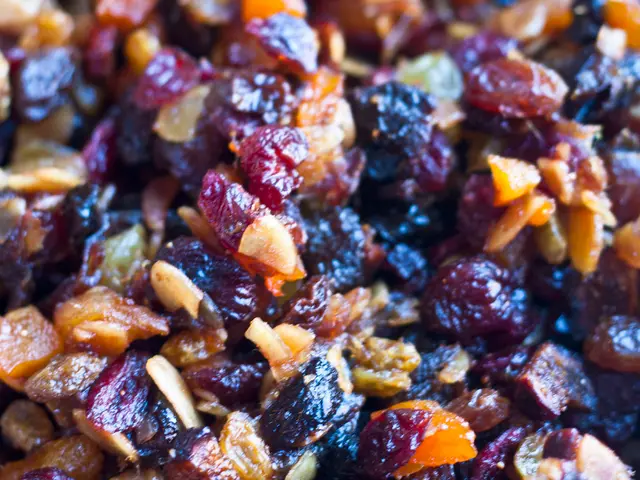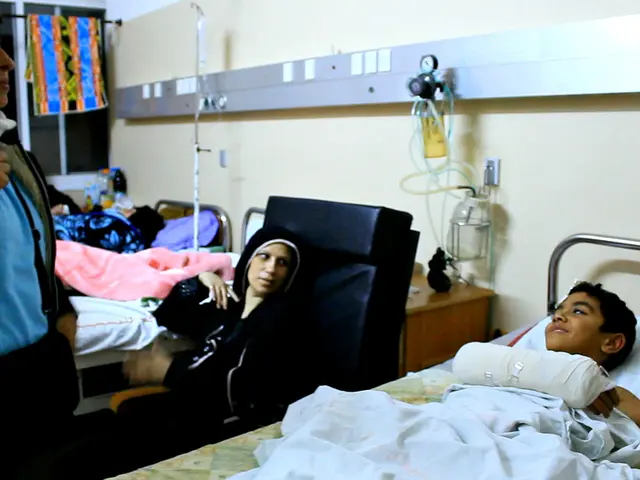Cicada Terror: A Pest Disrupting Germany's Agriculture
Emerging danger to sugar beet and potato crops posed by cicadas - Potato and Sugar Beet Threat: Emergence of Cicada Pose Danger
First, our beloved sugar beets started to falter, then our potatoes followed suit - now even onions, celery, red beets, cabbage, carrots, and partly rhubarb and peppers are under threat. The plant disease known as Stolbur, spread by the reed glass-winged cicada, is causing havoc across German farms, according to the German Farmers' Association. This "serious threat" to our domestic potato, vegetable, and sugar supply is particularly prominent in southern Germany, as declared by the Baden-Württemberg Ministry of Agriculture.
Estimates show that damages could reach "millions" in Baden-Württemberg alone, with climate change aiding its spread.
What's happening to our crops?
The bacterium Candidatus Phytoplasma solani is transmitted to plants via the bites of the reed glass-winged cicada, causing disease. Infected crops wilt, roots and tubers become rubbery. Yield declines, and quality suffers, lowering sugar content, for example. In severe cases, sugar beets, potatoes, and vegetables become inedible.
In the last couple of years, the affected area in sugar beets has gone from 40,000 hectares in 2023 to at least 75,000 hectares, which is about a quarter of Germany's cultivation area. Potatoes are one of the few foods we can largely produce domestically, but the reed glass-winged cicada is increasingly making inroads. For instance, the Union of German Potato Growers (UNIKA) has classified around 65,000 hectares as regions where these cicadas can infect potatoes, which approximate to about a quarter of the total cultivation area of this crucial staple food in Germany.
Wilting potatoes have become more common since 2024, especially in the warmer south - from Karlsruhe to the Hohenloher Ebene and from Heilbronn via Ludwigsburg to Stuttgart.
Where is the cicada active?
The insect has made its way from Baden-Württemberg across Rhineland-Palatinate, Bavaria, and Hesse to the rest of Germany, as per the German Farmers' Association. Lower Saxony, Saxony, and Saxony-Anhalt are also affected.
The southwest is particularly impacted in terms of spread and economic consequences, according to the state farmers' association, who note that the cicada is especially prevalent where cultivation areas of sugar beets, potatoes, and vegetables overlap.
What does this mean for consumers?
Authorities and associations claim that there are no indications that Stolbur could be harmful to humans. Moreover, potatoes and vegetables with an odd texture or signs of rot don't even make it to the market.
If the disease continues to spread, consumers may face fewer local potato options.
Farmers get the short end of the stick.
The pest infestation results in significant losses for farmers, with affected potatoes and vegetables going unsold. Owing to the need for increased sorting and disposal, damage is also caused in the form of extra effort.
Last year, there were yield losses of up to 25% in sugar beet cultivation areas in Baden-Württemberg, and up to 70% in potato farming. In some cases, the continuation of cultivation may be at risk.
Why is Stolbur so menacing?
Apart from sugar beets, numerous other vegetables are now being affected. At the same time, there is no effective protection against the pest, as stated by the potato association UNIKA. Furthermore, the climate is accelerating its spread.
Climate change plays a role in the rapid increase in reed glass-winged cicada activity between May and August, as they breed profusely in warm early summers and hotter summers. Unfortunately, this could lead to other crops in close proximity to beet cultivation areas being infected.
The Federal Office for Consumer Protection and Food Safety (BVL) may permit the use of unapproved plant protection products in an emergency if no other control methods are available, but this comes with strict conditions.
Farmers are urging for quick political action, demanding that effective means of controlling the cicada are allowed. They also support research on resistant breeding to tackle this challenge in the coming years.
The reed glass-winged cicada has quickly become one of the largest agricultural hurdles Germany will face in the coming years, as stated by the chairman of the Economic Association Sugar. "We urgently need support here."
Enrichment Data for Further Understanding:
Impacts on German Agriculture
- Stolbur Disease Overview: Stolbur phytoplasma causes severe damage to multiple crops, particularly potatoes and sugar beets, but also impacts other vegetables. Symptoms include yellowing, stunting, premature leaf drying, decreased yield, or total crop failure[1][2].
- Recent Crisis: Germany is currently experiencing one of its most severe agricultural crises due to the rapid spread of Stolbur, as the reed glass-winged cicada population and activity have multiplied dramatically. This has led to devastating crop losses in both potato and sugar beet cultivation[1][2].
- Economic Consequences: The damage intensifies because once a field is infected, the disease persists and can spread to nearby plots, resulting in widespread losses for farmers and threats to food security[1].
Potential Solutions
- The Integrated Pest Management (IPM) Approach: This strategy includes insect control through targeted insecticides, crop rotation, and planting resistant crops.
- Vector Management: Controlling the reed glass-winged cicada requires weed management, using netting or other barriers in high-risk areas to limit cicada access to crops.
- Monitoring and Early Detection: Field monitoring, diagnostic tools, and guaranteeing that farmers receive up-to-date information on effective methods for managing vectors and the disease.
- Policy and Research: Increased funding for research into resistant crops, alternative control methods, and understanding vector-disease dynamics, as well as education and extension services for farmers.
[1] Schwarz, S., & Rokár, F. (2022). Stolbur phytoplasma disease in sugar beet in Europe during the past decade. In V. Ogbu (Ed.), Advances in Agricultural Research, Vol. 135 (pp. 1-25). Springer, Cham.
[2] Garzon, M. A., Jaramillo, J. A., Gómez, N. M., Rojas, A. P., & Burgos, L. (2017). Stolbur Phytoplasma causa en Colombia una crisis agrícola en la producción de mazorcas mole y patatas (Solanum tuberosum L.) en Jardines del Eden, Cundinamarca, Colombia. Boletín de Información FITOQUÍMICA, (40), 34-38.
- The community is growing concerned about the impact of the reed glass-winged cicada on Germany's agriculture, particularly on commonly cultivated crops such as sugar beets, potatoes, and various vegetables, due to the common agricultural policy-related issue of Stolbur disease.
- As climate change continues to aid in the spread of the reed glass-winged cicada, science and medical-conditions, specifically environmental-science, are crucial in understanding the role of weather patterns in the increased activity of the pest between May and August.
- In an effort to tackle the devastating effects of the reed glass-winged cicada and Stolbur disease, common agricultural policy, health-and-wellness, and both farming and scientific research could collaborate on solutions such as the Integrated Pest Management (IPM) approach, vector management, monitoring and early detection, and policy and research for resistant crops and alternative control methods.








